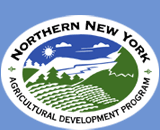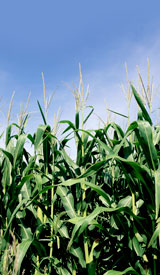

Northern New York Agricultural Development Program Press
Releases
May 4, 2006
Contact: Dr. Jerry Cherney, Cornell University, 607-255-0945
�World�s Largest Trial� Evaluating Perennial Grasses as Dairy Crop in NNY
As homeowners prepare to mow lawns once again, North Country farmers are
hoping their grass grows and grows and grows into prime cattle feed.
Perennial grasses by their natural recurrence year after year save farmers
the need and the cost to replant seed each year. With a Northern New York
Agricultural Development Program grant, researchers from Cornell University
are evaluating grasses in what may be the world�s largest tall fescue trial.
The 2006 field trials at the Extension Learning Farm in Canton and at the
Cornell plots at the W.H. Miner Agricultural Institute in Chazy involve five
replicates and at least three harvests of 47 varieties of perennial grass.
�Most cropland in Northern New York is better suited to perennial grass
production than to legumes and row crops. Regional soil and climate strongly
influence variety persistence and performance. We need a method for
evaluating yield and quality among the many varieties. This project will
provide that evaluation,� says Dr. Jerry Cherney, New York State Forage
Specialist.
Cherney leads the grass variety trial research and is considered a leading
authority on grass production in the U.S.
In past research in the NNY region, tall fescue often ranked the highest for
yield among grass species that grow well in cooler climates. New varieties
of tall fescue recently released for use in the Northeast have improved
palatability and yield. For the 2006 trials, two other species of grass have
been planted as a measurement standard for comparing yield and quality of
the new varieties.
Field Crops Educator Peter Barney of Cornell Cooperative Extension of St.
Lawrence County says these grass trials are important to Northern New York
dairy farmers because �We are always looking to give farmers more options.
We know we can grow tall fescue. We know dairy cows will eat tall fescue. We
need to add to our information on which varieties will establish the easiest
in our soil conditions, will withstand adverse weather conditions, and will
yield relatively high tonnages of dry matter per acre of quality forage for
milk cows.�
The farm crew of the Cornell E.V. Baker Research Farm at Willsboro seeded
the tall fescue trials at the Cornell plots at W.H. Miner Agricultural
Institute in Chazy two years ago. Baker Farm Manager Michael Davis says the
trials are producing data that will be valuable to regional farmers as they
begin planting tall fescue on their farms.
�Tall fescue is an incredibly productive grass crop. The first year trials�
three harvests have produced data on heading (optimum harvest) dates and the
fiber, crude protein and other feed value indicators,� Davis says. �We are
also closely watching the leaf structure and texture for how it will affect
the palatability for dairy cows.�
Cherney with Debbie J. R. Cherney, a Cornell University Animal Science
professor, has tested tall fescue in dairy cow rations compared to alfalfa
and other grasses. He says no problems with palatability were observed in
any of the three dairy feeding trials they conducted. Cherney adds that,
when dairy rations are balanced, feeding tall fescue silage can produce as
much milk per cow as alfalfa silage.
The Northern New York Agricultural Development Program is a farmer-driven
research and education program specific to New York state�s six northernmost
counties (Jefferson, Lewis, St. Lawrence, Franklin, Clinton, Essex). For
more information, visit
www.nnyagdev.org or contact Board Chairs Jon Greenwood, Canton,
315-386-3231, or Joe Giroux, Plattsburgh, 518-563-7523, or call Dave Smith
at Cornell University at 607-255-7286.
